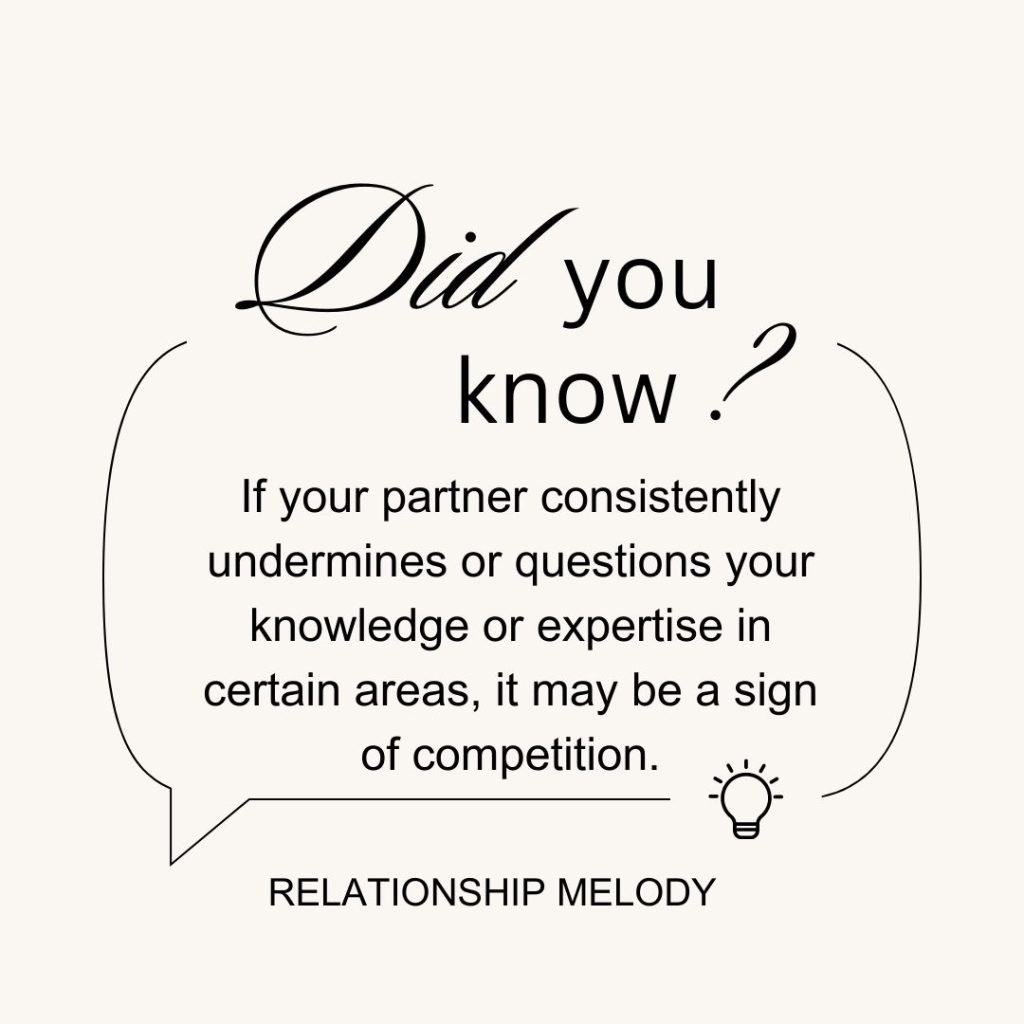25 Signs He Is Competing With You
In any healthy relationship, support, cooperation, and mutual growth are crucial. However, there are instances when one partner may unknowingly engage in unhealthy competition, jeopardizing the foundation of the relationship.
Recognizing the signs of competition is essential for maintaining a healthy and balanced partnership. In this blog post, we will explore 25 signs that indicate your partner may be competing with you.
By being aware of these signs, you can address the issue and work towards fostering a more supportive and loving connection.
25 Signs He Is Competing With You
These are 25 signs to know.
#1 Constant Comparisons:
If your partner is constantly comparing your achievements to their own, it may be a sign of unhealthy competition. They may feel threatened by your successes, leading them to diminish or dismiss your accomplishments.
#2 Defensiveness:
Instead of celebrating your achievements, a competitive partner may become defensive when you share your good news. They might respond with a counter-achievement or belittle your accomplishment to shift the focus back to themselves.
#3 One-Upmanship:
Competitive partners tend to one-up you in conversations. No matter what you say, they always have a better story, experience, or achievement to share, overshadowing your contribution.
#4 Jealousy:
A competitive partner might display signs of jealousy when you succeed or receive attention. They may struggle to genuinely celebrate your achievements and feel threatened by the positive attention you receive.
#5 Invalidating Your Feelings:
When you express your emotions or concerns, a competitive partner might downplay or invalidate them, making you feel like your feelings are unimportant compared to their own.
#6 Passive Aggression:
Subtle digs and passive-aggressive comments aimed at undermining your self-confidence or achievements are common signs of competition. They may use sarcasm or backhanded compliments to belittle you.
#7 Keeping Score:
Competitive partners tend to keep score of everything. They maintain a mental tally of who has achieved more or who is ahead in various aspects of life, turning everything into a competition.
#8 Seeking Validation:
If your partner constantly seeks validation for their accomplishments, even when they are unrelated to yours, it may indicate a need to prove themselves superior to you.
#9 Sabotaging Your Success:
In extreme cases, a competitive partner may resort to sabotaging your success. They might intentionally undermine your efforts or create obstacles to prevent you from achieving your goals.
#10 Dismissing Your Goals:
Competitive partners may dismiss or belittle your goals and aspirations. They may see them as a threat to their ambitions and attempt to minimize their importance.
#11 Undermining Your Expertise:
If your partner consistently undermines or questions your knowledge or expertise in certain areas, it may be a sign of competition. They might feel threatened by your competence and try to diminish your skills.

#12 Constant Comparison to Others:
A competitive partner may not only compare themselves to you, but also others in your social circle. They may feel the need to outshine their friends, colleagues, or even family members.
#13 Nitpicking:
Competitive partners may frequently nitpick and criticize your actions, pointing out flaws and mistakes in an attempt to make themselves look superior.
#14 Stealing the Spotlight:
When you receive positive attention or accolades, a competitive partner might try to steal the spotlight by redirecting the focus onto themselves. They may interrupt or divert conversations to regain the center of attention.
#15 Belittling Your Achievements:
Instead of celebrating your successes, a competitive partner may downplay your achievements or dismiss them as insignificant. They might imply that their accomplishments are far more impressive.
#16 Always Being Right:
Competitive partners often have an insatiable need to be right in every argument or discussion. They refuse to accept differing viewpoints and may engage in debates solely to prove their superiority.
#17 Excessive Bragging:
If your partner consistently brags about their achievements, possessions, or experiences, it might be a sign of unhealthy competition. They may seek validation and admiration to affirm their superiority.
#18 Hyper-Competitiveness in Games or Sports:
While healthy competition in games or sports can be enjoyable, a competitive partner may take it to an extreme. They may become overly competitive, displaying frustration or anger when they lose.
#19 Demeaning Your Efforts:
Competitive partners may demean or belittle your efforts when they perceive them as a threat. They might trivialize your hard work or dedication, dismissing it as insignificant.
#20 Withholding Support:
When you need support, a competitive partner may withhold it, fearing that assisting you may somehow diminish their position or achievements.
#21 Constant Need for Recognition:
Competitive partners have a constant need for recognition and validation. They may fish for compliments or seek external approval to validate their worth.
#22 Refusing Collaboration:
In collaborative situations, a competitive partner may resist working together as a team. They may view collaboration as a threat to their achievements and prefer to work independently.
#23 Overcompensating for Failures:
When your partner experiences a setback or failure, they might overcompensate by belittling your achievements or emphasizing your failures. It is a defense mechanism to maintain their self-perceived superiority.
#24 Making Everything a Contest:
A competitive partner turns even the smallest tasks or everyday activities into a competition. They constantly strive to come out on top, even in situations where competition is unnecessary or unwarranted.
#25 Lack of Genuine Support:
The most telling sign of a competitive partner is their lack of genuine support. They may struggle to provide encouragement, empathy, or understanding when they need it most, focusing solely on their agenda.
Learn more: 25 Signs He Is Completely Over You.
Conclusion:
Recognizing the signs of competition in a relationship is crucial for maintaining a healthy and supportive bond. If you identify any of these signs in your partner, it is essential to communicate openly and honestly about your concerns.
Healthy relationships thrive on cooperation, empathy, and mutual support. By addressing the issue together, you can work towards building a stronger foundation that fosters growth, understanding, and genuine partnership.
Remember, it is not about competing against each other, but rather growing and succeeding together.
Liked Our Article?
Our Patreon link: https://www.patreon.com/RelationshipMelody

Welcome to Relationship Melody! Our website is dedicated to all things on relationships, dating, and love! We are passionate about helping you navigate the ups and downs of love, and our goal is to provide you with valuable insights and information that will make your journey toward a fulfilling relationship smoother and more enjoyable.







